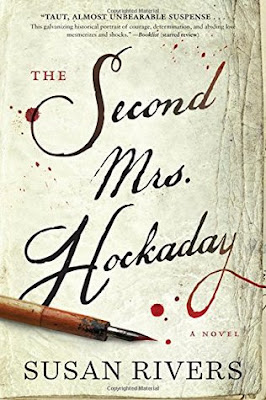Birchie was all about The Accomplice by Lisa Lutz in November and I joined the bandwagon and requested it from my library immediately. Lutz wrote The Spellman Files and a bunch of other books that made me chortle a lot, so I had very high hopes for this one.
Owen and Luna have been good friends since college. Like, really good friends. No, they're not dating or being physically intimate, but it's clear that they are a pair and are loyal to each other above all else. Even when they get married, their spouses are sort of on the outside looking in. This is a dual timeline dealio and we go from current time when Owen's wife is murdered to Owen and Luna in college when one of their classmates is killed. Why are people always dying around these two?
Look, my friends. This book was so funny. I don't know why, but Lutz's writing really resonates with me and there's something on every page that makes me giggle. There are some Goodreads reviews that are critical of this book for focusing on the friendship between Owen and Luna and call it unrealistic and that just gets my goat. It's perfectly reasonable and plausible for men and women to have friendships that don't veer into sexual attraction. It's even plausible for those to be close friendships! I find the relationship between the two of them to be incredibly interesting and fascinating and would love to read more about them.
This is loosely a mystery/thriller book in which Lutz wants us to be invested in who killed Owen's wife, but let's be real. The mystery wasn't particularly interesting, but what was interesting was how the death of this woman impacted Luna's relationships, especially with Owen. Who does she really trust? Who does she turn to in times of grief and sadness?
So many little things I love:
1) Sam, Luna's husband, having the same name as Sam the Dog.
2) The terrible scene when Luna goes to visit her mom on Christmas. I will be thinking about that scene for a long time.
3) How Owen is constantly in a bathrobe. (Paul Sinha on Taskmaster vibes.)
4) The realistic portrayal of how someone with epilepsy deals with their condition.
5) The offhand mention to Kant.
Tangent you can skip because it has nothing to do with this book:
(There is an inside joke between me and my husband and it's a long story and I'm not sure if it's going to make good reading or if it even has a good payoff for a reader who is not me, but the Kant reference is nowhere else on my blog, so here it goes. In grad school, everyone in our cohort had to take an intro class called Scope and Methods and we talked about all the subfields, even though we were generally only going to be doing further studies in two of the subfields. On weeks when the class covered your subfields, you were generally rolling your eyes because the assigned texts were pretty foundational. However, on weeks that weren't on your subfield, you might be lost because you probably hadn't even taken any undergrad classes in these topics, let along grad classes.
Anyway.
I felt really overwhelmed by the international relations and theory weeks and pored over the texts as if I was going to be interrogated by the FBI over their contents. After the class we went over the theory texts, I was talking to a theorist about the reading in a bar - I was drinking Sprite, he was drinking beer - and I was honestly really confused about something and at one point I reached into my bag, pulled out the reading, and said, "Kant says blah, blah, blah" and the half-drunk theorist* looked at me dead in the eye and said: "Kant is a tool."
And that's the "joke." Kant is a tool because MN** said so twenty years ago. Whenever one us is wrong, but we refuse to give in and admit it, we just end the conversation by saying that Kant is a tool.)
Minor beef that came up repeatedly in this book:
There are a number of historical anachronisms in this book. Lutz uses the word "square" as in "...Luna appeared normal, reliable, and even a bit square" (page 3 - 2002 timeline) and "I can't decide if you're genuinely square or a closet perv" (page 130 - 2019 timeline) and I will argue that no one has used the word square to mean boring since the 1950s, certainly not unironically. Weird word choice, Lutz.
There's also a bit about Owen finishing a semester remotely in 2004, which was just not a thing. Very strange.
Lines of note:
"Has anyone every told you that you have the social graces of a mobster?" (page 4)
Ha ha ha. Do mobsters have bad manner?
Luna thought about it, sighing, exhausted by her own neuroses. "I've got a lot of things, don't I?"
"You do," Owen said. "It's so awesome." (page 34)
Don't we all have things? I love this exchange and how it really shows that what might be a quirk about yourself that you don't really like someone else can find charming and endearing. Like my husband's inability to remember where he put any paperwork anywhere. Bless him.
Sam [the human, not the dog] often offended people. He could never quite figure out what he was doing wrong. (page 191)
This is my entire life. I'm forever apologizing for things without being entirely sure why what I said was offensive. This is one of my things that my husband deals with.
Receiving something in the mail was such a thrill, he finally understood why Luna continued to use that form of communication. (page 248)
Yes! Getting fun mail is the absolute best.
Over a dinner of pasta Puttanesca, Owen watched Luna pick sardines from her plate and casually toss them onto Griff's dish. Griff, with the same ease of familiarity, plucked olives from his dish and stacked them into a pile on Luna's salad plate. It was like watching them kiss, Owen thought. (page 291)
Nice observational writing about what it's like to be in the presence of a long-standing couple.
Their conflict was based on two different worldviews.
Owen's: Let's say Mom did kill Dad. It sucks, but what are we gonna do about it? Turn her in? Dad was about to die anyway. And maybe she didn't want him to suffer.
Griff's: WTF? If Mom killed Dad, that's not okay. I'm not suggesting we call 911 and have her taken away in cuffs, but we should, at the very least, get to the bottom of it and make sure she knows that offing people isn't okay. (page 309)
Discussions in our household about assisted suicide and euthanasia often come down to this very same argument. It was interesting to see it written out so bluntly.
[Someone was in the hospital.]
"What year is it?"
"It's 2019."
"Who is the president?"
"No."
"I'll accept that answer..." (page 323)
Apparently, some variation of this conversation happened when Dr. BB broke his
collarbone and he was in the ambulance.
4.5/5 stars for this one
*Yes, my husband is a theorist. No, he was not the person I was talking to that day.
**I just reread my 45-word description of this man and I was right. He couldn't handle the politics of academia and he has a job in the non-profit sector now. He's a dear, dear man, though, and his wife and children are lucky to have him.
























